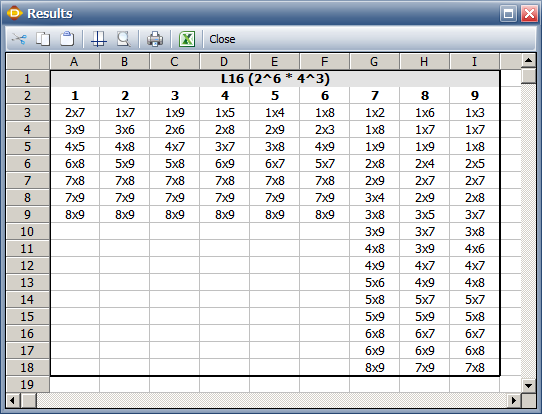

| Related Topics: | ||
The alias table for a Taguchi orthogonal array (OA) factorial design shows the aliased effects that would result from assigning certain factors to certain columns in the orthogonal array of the selected Taguchi design type (such as an L8 (2^7) design).
The table can be accessed from the Design tab of the standard design folio while configuring a Taguchi OA factorial design. To open it, click the Additional Settings heading in the navigation panel and then click the View Alias Table icon in the input panel.
![]()
As an example, the L16 (2^6 * 4^3) design uses 16 runs to investigate the main effects of up to 6 two-level factors and up to 3 four-level factors. The alias table for this design is shown next.

The numbers in Taguchi OA alias tables represent factors that are assigned to columns in the array. For instance, “1” represents the factor assigned to the first column in the array (if any). “2x3” represents the interaction effect of the factors assigned to the second and third columns. Each column in an alias table lists the 2-way interaction effects that are aliased with the main effect of the factor listed in the column header.
For example, suppose your design includes 2 two-level factors (A and B) and one four-level factor (C). Furthermore, suppose you used the drop-down lists under the Taguchi Column Indices header of the Additional Settings to assign factor A to the first column in the orthogonal array (A = 1), B to the second column (B = 2) and C to the seventh column (C = 7). According to the above alias table, the main effect of A (1) will be aliased with the interaction effect BC (2x7).
The ReliWiki resource portal has more information on Taguchi OA alias tables at: http://www.ReliaWiki.org/index.php/Highly_Fractional_Factorial_Designs.
© 1992-2015. ReliaSoft Corporation. ALL RIGHTS RESERVED.